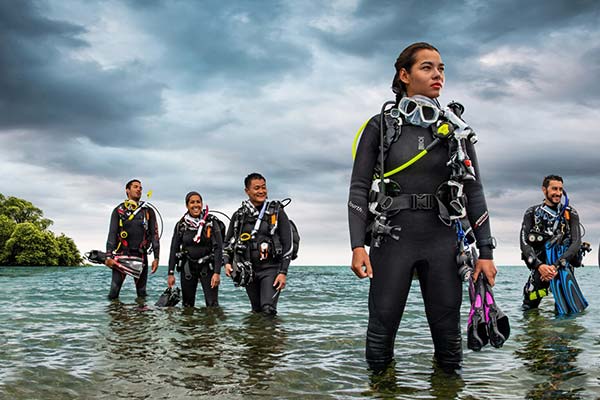Starting your PADI IDC is the first step towards an exciting career as a dive instructor. Choosing the right IDC is crucial and can greatly influence your success as a diving instructor.
With so many options available, it’s easy to stumble into common pitfalls that could hinder your training and your future dive career. Here’s a personal, upbeat guide on ten pitfalls to avoid when selecting your PADI IDC, ensuring you make an informed and positive decision.
Heads up: These points are based on my personal experience and opinions. Since I am offering PADI IDC courses myself, my opinion is obviously biased. You might have different views, and that’s totally OK! Just know, that I once completed the IDC myself and started looking for a job as a fresh PADI instructor. After 20+ years as an instructor, dive center manager, and Course Director across Asia, I think some of my tips may help aspiring PADI instructors like you.
1. Neglecting to research the Course Director
Your Course Director is pivotal in your PADI IDC experience. They’ll mentor you and shape your attitude and skills. An IDC website or Facebook page that doesn’t mention the Course Director’s name, would be a red flag for me.
When enquiring about the PADI IDC, are you communicating directly with the Course Director who will teach you or just some dive center sales staff? Make sure you have a direct line to your future Course Director!
I’m always happy to share my contact details and WhatsApp with anyone interested in my IDC courses.
2. Overlooking the dive center’s reputation
A dive center’s reputation is just as important as the Course Director. A reputable center offers a professional environment and in-house facilities, suitable for the PADI IDC. Commuting between the classroom, off-site pool, and open water site wastes valuable time.
Choosing a reputable dive center with suitable facilities will allow you to use your time effectively and you’ll have a much better learning experience!
3. Choosing based on price alone
While it’s tempting to go for the cheapest option, remember that you often get what you pay for. The cheapest option may not provide the training, the facilities, and especially, the support you need to succeed.
Saving some money when training for a job that you are passionate about and that you intend to do for many years, seems silly to me.
Investing in a quality IDC program that gives you practical training and full career support, instead of just getting you this instructor certification, will pay off in the long run.

4. Opting for a free internship
Free internships might seem appealing, but they often come with hidden costs. You’ll end up working without pay for several months and covering your own expenses, which can add up. All this time you could be working in a real instructor job, earning a decent salary.
Dive centers offering these free internships earn money by letting inexperienced ‘interns’ dive with their ‘highly valued’ customers. You may not even be teaching any courses yet, if the dive center holds back your certification out of fear that you will leave them before the ‘internship’ is finished. If there are many interns and not many customers you may end up doing donkey work like filling and hauling tanks. I simply heard too many horror stories.
Again, this is my personal opinion but it seems to me that free internships are often run by ‘less reputable’ dive operations who build their business on saving cost rather than on providing good customer service. Starting your diving career with such an operation can lead to a frustrating and unfulfilling experience and leave you disillusioned with the diving industry.
Simply avoid these dive centers. Reputable dive centers focus on quality training and customer service, setting you up for a successful career in diving. Quality comes a cost. There is no free trip to Hawaii.
5. Choosing solely based on reviews and testimonials
While reviews and testimonials can be helpful, it’s important to remember that everyone only does their IDC once, making direct comparisons difficult. Candidates often lack a frame of reference to objectively evaluate their experience.
Instead of relying solely on reviews, talk to former students and visit the dive center. This gives you a better understanding of what to expect and will guide you to the right choice!
6. Falling for the IE pass guarantee
Many IDCs focus heavily on passing the Instructor Examination (IE) rather than providing practical training that can be used in real-life courses with actual students. While passing the IE is important, the ultimate goal is not to learn a few ‘tricks’ to pass the IE, but to become a competent and effective instructor. When programs offer an “IE pass guarantee”, that’s a huge red flag for me.
Let me explain with an example.
During the IE you will be role-playing instructor and student. The examiner will assign ‘misstakes’. For instance, a student is unable to clear his mask. The instructor points at his nose and the problem is solved. Great! You passed the exam.
Of course, it doesn’t work like that in real life. If you have been working with novice divers during your Divemaster training you will probably know that already.
In Asia Scuba Instructors IDC’s, we focus on realistic teaching scenarios and you will gain a deeper understanding of how to handle real-life teaching challenges. Read my blog post about ‘teaching mask clearing’ and you’ll know what I mean.
Instead of teaching you tricks to pass the IE, we will make you a great instructor. You will be confident and ready to start teaching your first courses and the IE will be a walk in the park.

7. Not clarifying all costs upfront
Make sure you understand all the costs involved in the IDC, including materials, instructor application fees, and any additional expenses.
PADI Instructor Examination fees and instructor application fees are paid to PADI directly so they should be the same worldwide. PADI IDC materials contain IDC eLearning, IDC Slatepack, and EFRI eLearning. You will probably buy these from the dive center so prices may vary.
Specialty instructor applications (per Specialty) and EFR Instructor applications are paid to PADI separately so make sure you have all this lined up.
Knowing the full cost upfront helps you avoid unpleasant financial surprises.
8. Overlooking the support after the PADI IDC
The fun doesn’t stop after the IDC and IE. It’s only starting! The support you receive after completing your PADI IDC is crucial to get your instructor career on the right track. If you go for the cheapest programs you may be left on your own. Look for PADI IDC centers that offer real job placement assistance and speak to former candidates about their experiences.
Asia Scuba Instructors offers unparalleled job-finding support to guide you through every step on the way to your dream dive job. We’ll actively go job hunting for you, and we will set you up with an interview with one of the dive centers in our extensive network of dive centers throughout Asia.
Look at our job listing which includes a wide range of opportunities across Thailand, Indonesia, and the Philippines.
9. The party island trap
Popular party islands like Koh Tao and Gili Trawangan offer many IDC programs, often at lower prices. However, this might not be the best choice if you are serious about your diving career.
While the nightlife and party scene can be awesome, the diving conditions on these islands are mediocre at best, and the professional reputation you gain from these locations will stick with you for the rest of your career.
The reputation of these party islands runs far and wide so you may have difficulties finding a job elsewhere. Many dive centers will simply not hire instructors from Koh Tao. Period.
That being said, if you plan to stay and work on these islands, it could be a good choice to do your PADI IDC there. With their high volume of courses, you can earn decent money. Just don’t spend it all in the bars.
If you are serious about your career in diving, and you are planning to work in other countries, consider other locations.
10. Saving time by doing part of the IDC Online
Completing part of the PADI IDC online, using platforms like GoToMeeting and Zoom, became popular during COVID. Some dive centers still offer this option. There is already a large section of self-paced eLearning to prepare for the PADI IDC so it is great to prepare for your course at home. However, there is no substitute for hands-on experience at a dive center.
You can observe the daily organization of courses, chat with the instructors and other candidates, and learn from their stories and suggestions. It is also much more fun than sitting behind your laptop at home.
The practical part of the PADI IDC, conducted in a dive center, remains crucial for your development as an instructor.
Conclusion
Choosing the right PADI IDC is an important step towards a successful diving career. By avoiding these 10 pitfalls, you can select a program that offers the training that is right for you.
Take the time to research, ask questions, and make an informed decision. Choose an IDC that gives you the training, support, and opportunities to get your diving career started. Dive into your PADI IDC with confidence and give your instructor career a great start!



